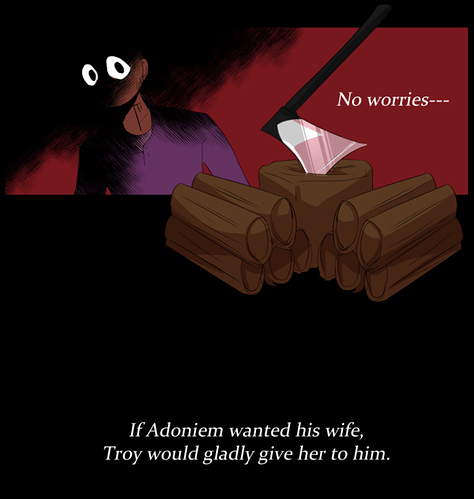I too rather intersperse information about my universe through action and dialog. It's a personal choice and I do feel it helps with my pacing. You learn about the two worlds through the character journeys. If I spent several pages explaining the mechanics of how everything works, I feel like I'd lose my readers' interest. (Because trust me, if I didn't control myself it'd be wild.  )
)
Hmm, yeah, but not straight-up exposition. Rather, I rely on unreliable narrator and repetition to get the meaning across. This is mostly done when I'm doing flashbacks or opening up a scene, so it kinda reads like a play narrator setting the scene.
When doing so, I focus on character interaction, character emotions, and kinda offer a way to peer into the character's mind. I think this is a pretty good example of this:
It's part of my Webtoon series With Butterflies in Her Hair. Here, I really love using unreliable narrator when going through flashbacks. The tone becomes darker, the words become twisted, and you don't hear an outsider explaining things: you hear Troy's voice.
I also like to use repetition before and after a scene -- words gain meaning and can have double meaning when more information is given. So I like to repeat one sentence at the beginning, and then at the end -- showing that change in feelings has changed the words.
I find if more exposition could be done this way, things would get a bit more interesting. Sometimes, you can explain things: but explaining them in a way that shows bias, or has some type of double meaning, makes the information more interesting, and it makes the reader kinda pay attention to see who's lying and who's telling the truth.
If I need to go into a bunch of exposition, I'll do it through dialogue, and try to keep that dialogue, and the art, engaging. I'm coming up on a LOT of exposition soon, but I'm hoping/expecting it to land well for a few reasons,
- It answers a mystery the readers will be very curious about.
- It's delivered in two different batches, so it's not all at once. Batch one answers one mystery, and presents another even more tantalising one. Batch two answers that second mystery.
- One batch is an interrogation, so it's understandable that the characters are delivering information clearly.
- Batch two is half interrogation, half negotiation, and we see the characters behaving more warmly toward each other for the first time.
- I'm lacing a lot of characterisation and emotion all through this, so it'll be emotionally gripping to the reader, rather than just boring.
- I'm going to make it look pretty.
I have an extremely detailed magic system and lore which I only want to skim across the top of in Blue Star Rebellion, but I need to go just deep enough for my readers to understand what's going on, what's at stake, and why. It's one hell of a balancing act!
I avoid exposition as much as I can these days. I had two exposition dumps on The Ghoul (you guys were spared the first one but had to suffer the second one) due to length constraints, and I've learned much from it.
For the more episodic Classic Fantasy, it is my hope and objective to have any and all information be presented organically as characters experience the world around them (this will work best since one of the main characters, Angelo, is a newbie to the adventurer's life) and interact with one another. Of course there is no easy way out of expositions, so this is all what I intend to do, and not necessarily what is possible to do.
Honestly I rather not do that, because I like to wait and unveil new exciting things here and there so the reader gets to experience the unpredictable storytelling they aren't expecting from the creator! Adding new elements as I go. I think that is what makes a story unique and fun to read all at the same time.
For me, everything gets explained eventually. There are probably a lot of questions reader have about characters/concepts in my series. Anything that's important and relevant will get answered at some point down the road. I like letting readers piece little things together instead of revealing everything all at once. It can help build suspense and develop a character's personality if done right.
I feel like my current spot in my webcomic Future Agents is probably the most info-dumpy it has been because they're explaining the mission statement of the organization through dialogue. But I try to make it relevant to the story... in this case, the Chief Technology Officer isn't honoring the mission statement of the Future Agents by putting his own concerns first, and the others have to remind him why the mission statement should be taken seriously. Sprinkle in some interesting art and I think it makes the reading experience more enticing. It also reveals the motives and ambitions of certain characters while also establishing relationships between them (some characters are getting very annoyed of each other! haha)
Yes and no.
Yes, because my current story is full of vague or less vague foreshadowing, so there is a lot of yet unexplained, but most will be explained by the end of the story.
No, because I often build complex political, administrative, economical, geographical etc contexts to my stories, but generally we see of them only what is pertinent to the story, and most aspects remain unexplained (at least in the story itself. I'm planning extras on these aspects for my current comic).
That was my intention on my first post too!
Looks like most authors responding here prefer not to do much explanation. I have seen a lot of stories that go into the endless explanation dialogue. It bores me quickly, honestly.
Not only I avoid explaining and treat my readers as the smart fellows they are as @Legendarylankman13 nicely pointed, I also intentionally insert elements that people expect an explanation that will never happen. Some because I really want them to remain mysterious. Some because I just want to laugh.
I also hardly introduce characters.
One other way of doing, in case of necessary complex explanation is to weave the story so some character slowly figures it out by investigating. That sort of leads the reader into figuring things themselves so it's far more memorable than just giving it away. Again, this means a lot of planning and effort.



 suprise xD
suprise xD